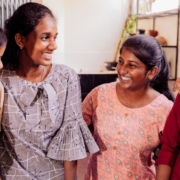How Innovation in Education is Changing Australia
By: Helping Hands TV
Students in rural and regional areas have an educational disadvantage, and addressing this issue can bring about social change across Australia. That’s the view of educators Chris North, Mia Patoulios and Thomas McDonnell, in a panel episode of Helping Hands.
Through the implementation of its innovative digital infrastructure, and by connecting schools and community groups to education resources produced by experts in their fields, Learning for Good is addressing this issue – ushering in a new era for education in Australia.
In this Helping Hands feature panel discussion, Chris North, founder of Learning for Good; Mia Patoulios, CEO of Sydney Youth Orchestras; and Thomas McDonnell, an English teacher, discuss how innovation in education is driving positive social change.
Today, the definition of quality education is increasingly recognised as a whole-life, and whole-community pursuit, no longer confined to the traditional teacher/student face-to-face classroom structure. And many educators are now looking beyond the four walls of the classroom for teaching resources that provide unprecedented learning opportunities for students.
However, educational experiences such as these are only possible with access to skilled adults who are experts in their fields, says Mia. And when it’s not feasible for the experts to be in classrooms in person, Learning for Good is the perfect way to bridge the gap.
Sydney Youth Orchestras (SYO) use the Learning for Good platform to effectively run programs, events and outreach activities across fifteen orchestras, and their resources and music experts are also available on the platform to equip music education for students who would otherwise not have access to quality music education.
SYO is just one organisation of many who are using Learning for Good to address educational disadvantage, says Chris. By embracing a digital offering, SYO’s impact increases exponentially, challenging long-held negative stigmas in regional and rural towns, enabling better and easier learning experiences and improving educational outcomes.
When speaking about regional disadvantage in education, Chris says students in rural and remote areas are just as passionate about learning new skills as students in urban and metro areas. “Their passion to want to learn something or do something doesn’t change (and providing access to) the expertise and help of somebody who’s an expert in their field, means that the transferral of knowledge comes through and then the teacher is more confident. As a student learning, the impact is exponential.”
Broadening educational experiences are transformative, says English teacher, Thomas McDonnell. For the students he teaches, Learning for Good is an excellent pathway of education that goes beyond the academic, facilitating a deeper connection to history, and helping to shape identity through a tangible connection to culture and country.
Referencing Indigenous education, Thomas says, “Traditional knowledge holders and owners need to be in classrooms as much as possible, and going on country is vital … Learning for Good can help bridge (that gap) where those things can’t happen. (They) keep the conversation going and keep the connection points occurring.”
See the INNOVATION IN EDUCATION AND SOCIAL CHANGE discussion and the full catalogue of Helping Hands panels at helpinghands.tv. Catch up on full episodes of Helping Hands on 9NOW.
Article supplied with thanks to Helping Hands TV.
Feature image: Screen image, Helping Hands episode
About the Author: Helping Hands is an Australian produced TV program that airs on 9GEM, Channel 9 and 9NOW, and showcases people and organisations who make the world a better place.


